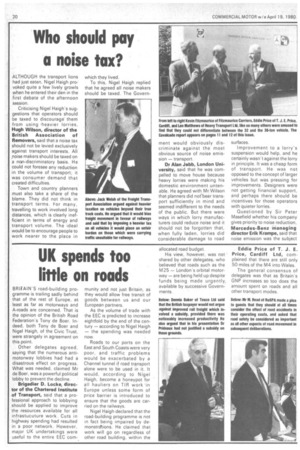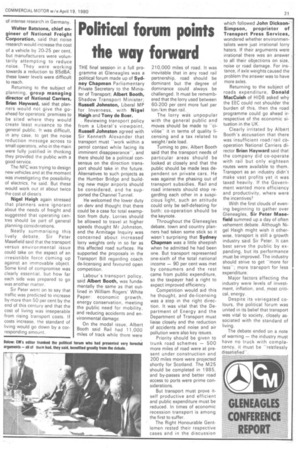Who should pay a noise tax?
Page 22

Page 23

If you've noticed an error in this article please click here to report it so we can fix it.
ALTHOUGH the transport lions had just eaten, Nigel Haigh provoked quite a few lively growls when he entered their den in the first debate of the afternoon session.
Criticising Nigel Haigh's suggestions that operators should be taxed to discourage them from using -heavier lorries, Hugh Wilson, director of the British Association of Removers, said that a noise tax should not be levied exclusively against transport interests. All poise makers should be taxed on a non-discriminatory basis. He could not foresee any reduction in the volume of transport; it was consumer demand that created difficulties.
Town and country planners must also take a share of the blame. They did not think in transport terms. For many, travelling to work involved long distances, which is clearly inefficient in terms of energy and transport volume. The ideal would be to encourage people to work nearer to the place in ment would obviously discriminate against the most obvious source of noise emission — transport.
Dr Alan Jebb, London University, said that he was compelled to move house because heavy lorries were making his domestic environment untenable. He agreed with Mr Wilson that planners did not bear transport sufficiently in mind and seemed indifferent to the needs of the public. But there were ways in which lorry manufacturers could reduce noise and it should not be forgotten that, when fully laden, lorries did considerable damage to road surfaces.
Improvement to a lorry's suspension would help, and he certainly wasn't against the lorry in principle. It was a cheap form of transport. He was not opposed to the concept of larger vehicles but was pressing for improvements. Designers were not getting financial support, and perhaps there should be incentives for those operators with quieter lorries.
Questioned by Sir Peter Masefield whether his company gives priority to noise reduction, Mercedes-Benz •managing director Erik Krampe, said that noise emission was the subject of intense research in Germany.
Walter Batstone, chief engineer of National Freight Corporation, said that noise research would increase the cost of a vehicle by 20-25 per cent, but manufacturers were voluntarily attempting to reduce noise. They were working towards a reduction to 85dBA; these lower levels were difficult to reach.
Returning to the subject of planning, group managing director of National Carriers, Brian Hayward, said that planners would not give the goahead for operators premises to be sited where they would create least nuisance to the general public. It was difficult, in any case, to get the noise 'reduction message across to small operators, who in the main were fully justified in thinking they provided the public with a good service.
The NFC was trying to design new vehicles and at the moment was investigating the possibility of electrics, he said. But these would work out at about twice the cost of diesels.
Nigel Haigh again stressed that planners were ignorant about the needs of freight and suggested that operating centres should be part of general planning considerations.
Neatly summarising this lively debate, Sir Peter Masefield said that the transport versus environmental issue could take on the aspect of an irresistible force coming up against an immovable object. Some kind of compromise was clearly essential, but how far each side was prepared to go was another matter.
Sir Peter went on to say that traffic was predicted to increase by more than 50 per cent by the end of this century and that the cost of living was inseperable from rising transport costs. If costs increase, the standard of living would go down by a corresponding amount.












































































































